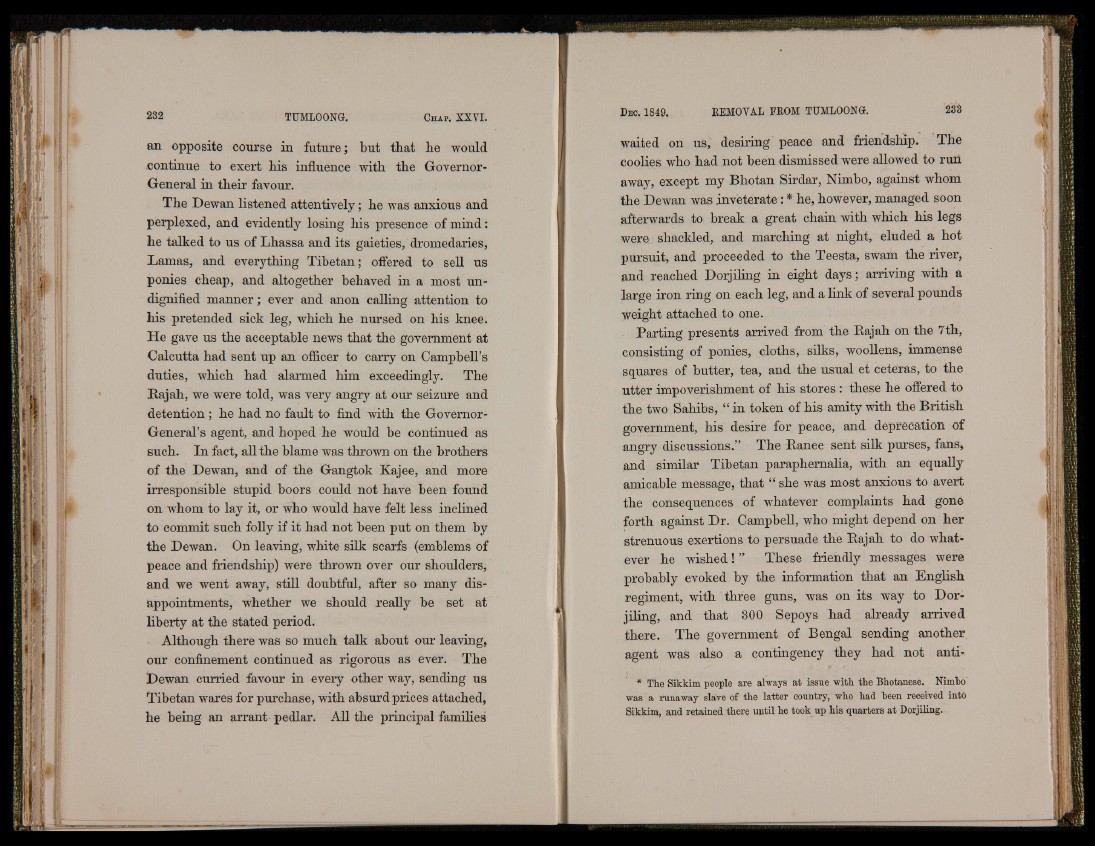
an opposite course in future; but that he would
continue to exert his influence with the Governor-
General in their favour.
The Dewan listened attentively; he was anxious and
perplexed, and evidently losing his presence of mind:
he talked to us of Lhassa and its gaieties, dromedaries,
Lamas, and everything Tibetan; offered to sell us
ponies cheap, and altogether behaved in a most undignified
manner; ever and anon calling attention to
his pretended sick leg, which he nursed on his knee.
He gave us the acceptable news that the government at
Calcutta had sent up an officer to carry on Campbell’s
duties, which had alarmed him exceedingly. The
Rajah, we were told, was very angry at our seizure and
detention ; he had no fault to find with the Governor-
General’s agent, and hoped he would be continued as
such. In fact, all the blame was thrown on the brothers
of the Dewan, and of the Gangtok Kajee, and more
irresponsible stupid boors could not have been found
on whom to lay it, or who would have felt less inclined
to commit such folly if it had not been put on them by
the Dewan. On leaving, white silk scarfs (emblems of
peace and friendship) were thrown over our shoulders,
and we went away, still doubtful, after so many disappointments,
whether we should really be set at
liberty at the stated period.
Although there was so much talk about our leaving,
our nnnfinp.mp.nt, continued as rigorous as ever. The
Dewan curried favour in every other way, sending us
Tibetan wares for purchase, with absurd prices attached,
he being an arrant pedlar. All the principal families
waited on us, desiring peace and friendship. The
coolies who had not been dismissed were allowed to ruil
away, except my Bhotan Sirdar, Nimbo, against whom
the Dewan was inveterate: * he, however, managed soon
afterwards to break a great chain with which his legs
were shackled, and marching at night, eluded a hot
pursuit, and proceeded to the Teesta, swam the river,
and reached Dorjiling in eight days; arriving with a
large iron ring on each leg, and a link of several pounds
weight attached to one.
Parting presents arrived from the Rajah on the 7th,
consisting of ponies, cloths, silks, woollens, immense
squares of butter, tea, and the usual et ceteras, to the
utter impoverishment of his stores: these he offered to
the two Sahibs, “ in token of his amity with the British
government, his desire for peace, and deprecation of
angry discussions.” The Ranee sent silk purses, fans,
and similar Tibetan paraphernalia, with an equally
amicable message, that “ she was most anxious to avert
the consequences of whatever complaints had gone
forth against Dr. Campbell, who might depend on her
strenuous exertions to persuade the Rajah to do whatever
he wished! ” These friendly messages were
probably evoked by the information that an English
regiment, with three guns, was on its way to Dorjiling,
and that 300 Sepoys had already arrived
there. The government of Bengal sending another
agent was also a contingency they had not anti-.
* The Sikkim people are always at issue with the Bhotanese. Nimho
was a runaway slave of the latter country, who had been received into
Sikkim, and retained there until he took up his quarters at Dorjiling.